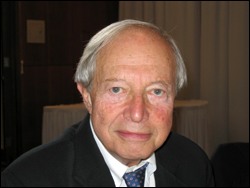Taiwan Looks Apprehensively Toward the Obama Administration
 Taiwan’s experience with the George W. Bush administration, particularly during Mr. Bush’s second term, has been rather unhappy. In large part this was because the policies of former President Chen Shui-bian seemed to be steering Taiwan toward formal independence, and therefore to a crisis with China.
Taiwan’s experience with the George W. Bush administration, particularly during Mr. Bush’s second term, has been rather unhappy. In large part this was because the policies of former President Chen Shui-bian seemed to be steering Taiwan toward formal independence, and therefore to a crisis with China.
 Taiwan’s experience with the George W. Bush administration, particularly during Mr. Bush’s second term, has been rather unhappy. In large part this was because the policies of former President Chen Shui-bian seemed to be steering Taiwan toward formal independence, and therefore to a crisis with China. This was hardly what the Bush administration wanted at a time when it needed Beijing’s help with North Korea along with some degree of cooperation vis-Ã -vis Iran, Sudan, as well as in the United Nations Security Council. Mr. Bush made his displeasure plain first by delaying action on a Taiwan arms purchase request, and then by severely restricting what would be sold.
Taiwan’s experience with the George W. Bush administration, particularly during Mr. Bush’s second term, has been rather unhappy. In large part this was because the policies of former President Chen Shui-bian seemed to be steering Taiwan toward formal independence, and therefore to a crisis with China. This was hardly what the Bush administration wanted at a time when it needed Beijing’s help with North Korea along with some degree of cooperation vis-Ã -vis Iran, Sudan, as well as in the United Nations Security Council. Mr. Bush made his displeasure plain first by delaying action on a Taiwan arms purchase request, and then by severely restricting what would be sold.
Given the inauguration of President Ma Ying-jeou who seeks to move from confrontation to some measure of cooperation with China, and given the imminent departure of Mr. Bush from Washington, one might believe that political circles in both Taipei and Washington are sighing with relief. But one would be wrong. Although Ma’s attempts to reach some sort of modus vivendi with Beijing ought to be encouraged and perhaps even rewarded by the Bush administration. They have done little of either.
Meanwhile, Taiwan’s politicians have always tended to be suspicious of Democratic administrations in Washington. It may have been the Republican Nixon who negotiated the opening with China, but in Taiwan they remember that it was the Democrat Carter who shifted diplomatic recognition to Beijing. Although it would be difficult to think of an American president who disdained Taiwan more than George W. Bush, in Taipei they think Democrats are more likely to succumb to the lure of China and in doing so, sacrifice Taiwan’s interests.
When it comes to President-elect Obama, the folk in Taiwan see him surrounded by advisers with just that mind set. They especially need the more modern version of their aging F-16 fighter aircraft which Mr. Bush denied. But they calculate, correctly no doubt, that even with faith in Mr. Obama’s praise of Taiwan as a beacon of democracy in East Asia, he will not want to start off his administration by offending China by selling the later model F-16s. No matter that China flies 21st century Russian-built aircraft, and the F-16 C/Ds they want are 1990 models. No matter that China’s air force outnumbers Taiwan’s by a factor of 10. And never mind that China has over 1100 missiles aimed at Taiwan. An F-16 sale to Taiwan will outrage Beijing, and one would have to admit that is hardly the way for an Obama administration to begin dealing with the world’s number one holder of U.S. Treasury obligations.
It is truly a pity that Mr. Bush did not have the gumption to deal with this himself, instead of walking away and passing it on to his successor.
— Ambassador Harvey Feldman, a member of JINSA’s Board of Advisors, led a delegation of election observers organized by JINSA and hosted by Taiwan’s Ministry of Foreign Affairs to observe the March 22, 2008 election. He travels to the Far East frequently and just returned from China on November 22. As a career Foreign Service Officer, Amb. Feldman served in Hong Kong for eight years, Taiwan for six, and Japan for four years. As a member of the Policy Planning Staff of the State Department, he helped plan President Richard Nixon’s epoch-making first visit to China, and continued involvement with the process of relations with China as Director of the Office of the Republic of China Affairs. In that capacity, he created the American Institute in Taiwan that replaced our embassy in Taipei after relations were shifted to Beijing. Though nominally an unofficial foundation, the Institute carries out all essential functions of our former embassy. Amb. Feldman also was one of the drafters of the Taiwan Relations Act-landmark legislation that defines our relationship with the Republic of China in Taiwan.